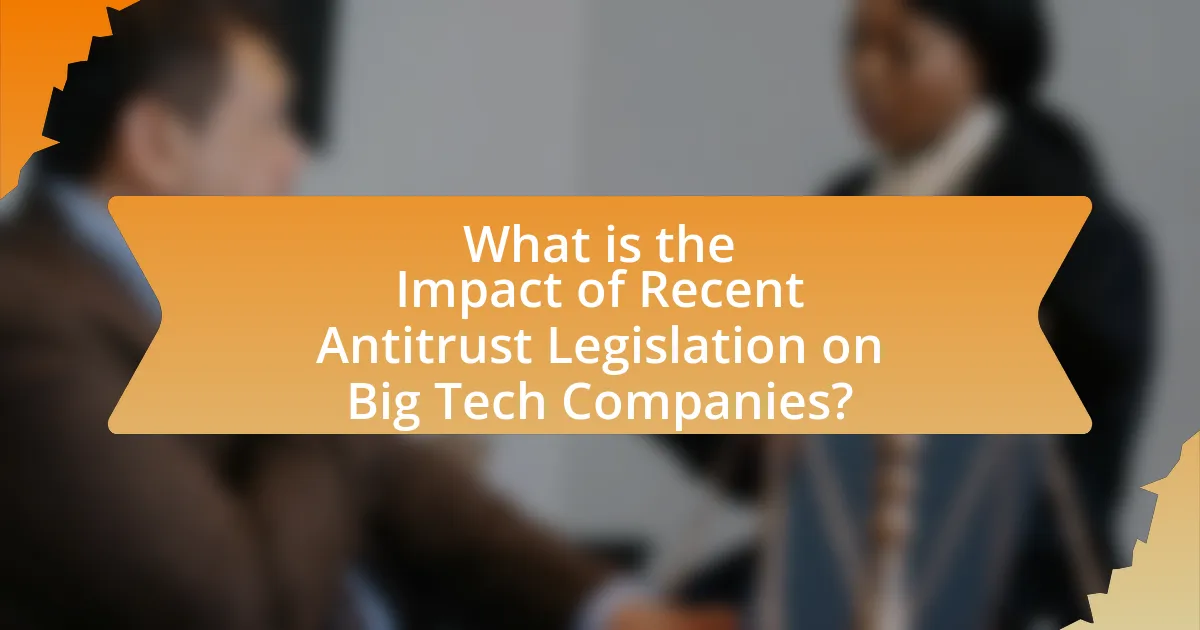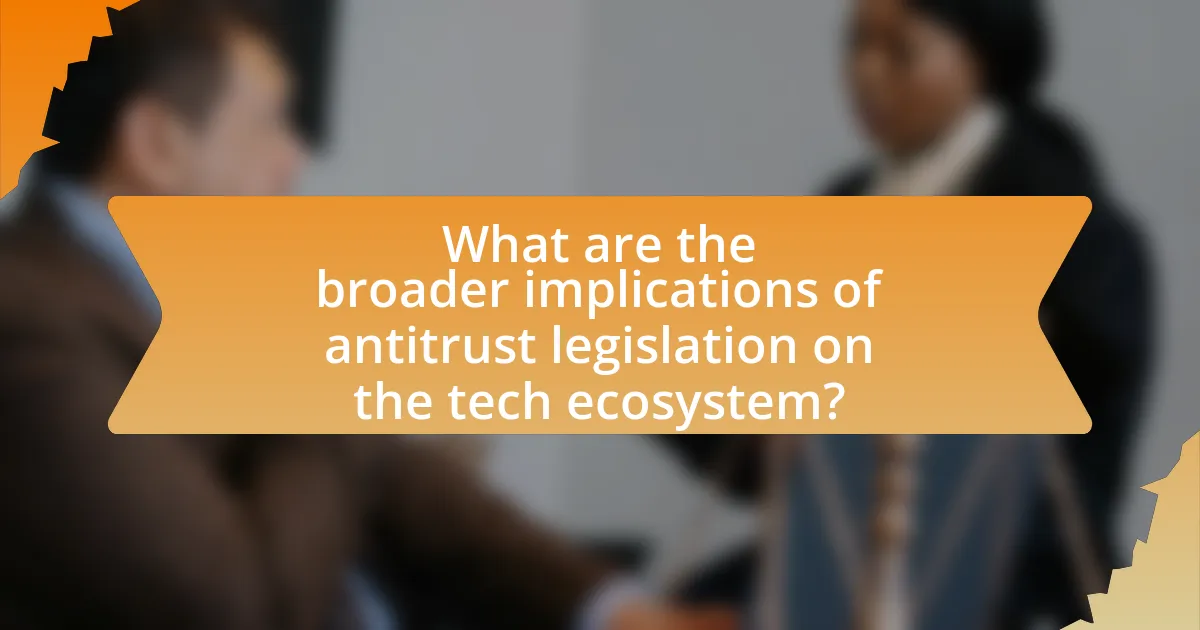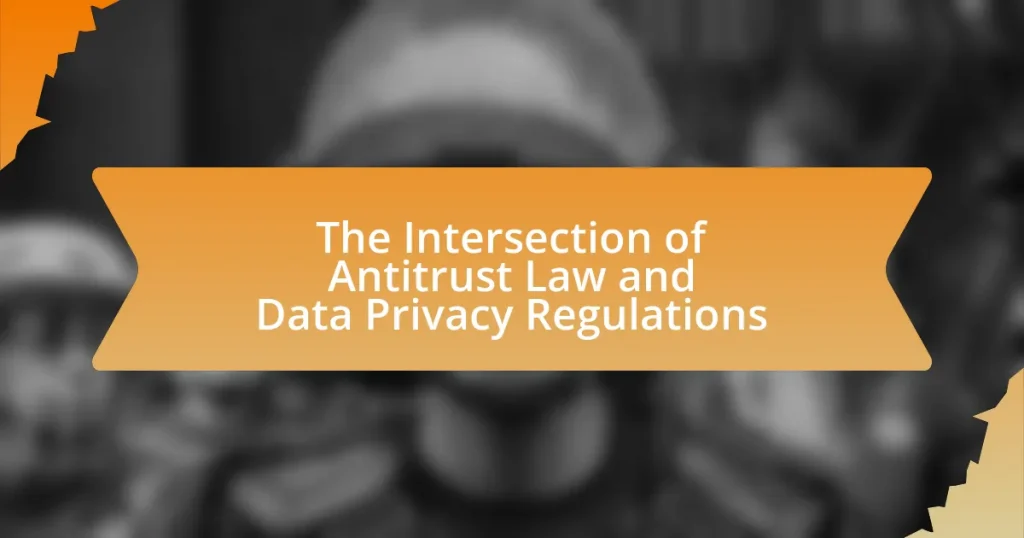The article examines the impact of recent antitrust legislation on Big Tech companies, highlighting increased regulatory scrutiny and potential penalties for anti-competitive practices. Key components of the legislation include measures to prevent monopolistic behaviors, enhance data privacy, and promote competition, specifically targeting firms like Google and Facebook. The article discusses how these regulations are reshaping business strategies, influencing mergers and acquisitions, and necessitating operational changes within these companies. Additionally, it explores the broader implications for consumer behavior, market dynamics, and the tech ecosystem as a whole.

What is the Impact of Recent Antitrust Legislation on Big Tech Companies?
Recent antitrust legislation significantly impacts Big Tech companies by increasing regulatory scrutiny and potential penalties for anti-competitive practices. This legislation aims to curb monopolistic behaviors, as seen in the proposed bills targeting companies like Google and Facebook, which could face stricter rules on data privacy and market dominance. For instance, the American Innovation and Choice Online Act seeks to prevent dominant platforms from favoring their own products over competitors, directly affecting how these companies operate. Additionally, the Federal Trade Commission has ramped up investigations into mergers and acquisitions, indicating a shift towards more aggressive enforcement of antitrust laws. This evolving legal landscape may lead to substantial changes in business strategies for Big Tech firms, as they adapt to comply with new regulations and mitigate risks of litigation.
How has recent antitrust legislation been defined and implemented?
Recent antitrust legislation has been defined as a set of laws aimed at promoting competition and preventing monopolistic practices, particularly targeting large technology companies. This legislation has been implemented through various measures, including increased scrutiny of mergers and acquisitions, enhanced enforcement of existing antitrust laws, and the introduction of new regulations specifically addressing anti-competitive behavior in digital markets. For instance, the U.S. Congress has proposed bills like the American Innovation and Choice Online Act, which seeks to prohibit dominant platforms from engaging in self-preferencing practices. Additionally, the Federal Trade Commission has ramped up investigations into companies like Google and Facebook, reflecting a shift towards more aggressive antitrust enforcement in the tech sector.
What are the key components of the recent antitrust legislation?
The key components of the recent antitrust legislation include provisions aimed at increasing competition, preventing monopolistic practices, and enhancing regulatory oversight of large technology companies. These components specifically focus on prohibiting anti-competitive mergers, imposing stricter rules on data privacy and usage, and empowering regulatory bodies to investigate and penalize unfair business practices. For instance, the legislation mandates that companies with significant market power must not engage in self-preferencing practices that disadvantage competitors, thereby fostering a more equitable marketplace.
How do these components specifically target Big Tech companies?
Recent antitrust legislation specifically targets Big Tech companies by imposing stricter regulations aimed at curbing monopolistic practices and promoting competition. These components include provisions that prevent anti-competitive mergers, enhance transparency in data usage, and impose penalties for unfair practices. For instance, the legislation mandates that companies like Google and Facebook must disclose their algorithms and data handling practices, which directly addresses concerns about market dominance and consumer privacy. Additionally, the Federal Trade Commission has been empowered to investigate and challenge mergers that could significantly reduce competition, as seen in the scrutiny of the proposed merger between Facebook and WhatsApp. This legislative framework is designed to dismantle barriers that allow Big Tech firms to maintain their market power, thereby fostering a more competitive environment.
Why is antitrust legislation important for the tech industry?
Antitrust legislation is important for the tech industry because it promotes competition and prevents monopolistic practices. By enforcing these laws, regulators aim to ensure that no single company can dominate the market to the detriment of consumers and innovation. For instance, the U.S. Department of Justice’s lawsuit against Google in 2020 highlighted concerns over its dominance in online search and advertising, which stifles competition and limits choices for consumers. This legal action underscores the necessity of antitrust laws in maintaining a fair marketplace, fostering innovation, and protecting consumer interests in the rapidly evolving tech landscape.
What historical context led to the current antitrust concerns?
The historical context leading to current antitrust concerns includes the rise of monopolistic practices in the late 19th and early 20th centuries, exemplified by the Sherman Antitrust Act of 1890, which aimed to combat corporate monopolies. This legislation was a response to the dominance of companies like Standard Oil and U.S. Steel, which stifled competition and harmed consumers. Over the decades, regulatory frameworks evolved, with landmark cases such as the breakup of AT&T in the 1980s highlighting the government’s role in curbing monopolistic behavior. In recent years, the rapid growth of Big Tech companies like Google, Amazon, and Facebook has reignited fears of monopolistic practices, prompting renewed scrutiny and legislative efforts to address potential anti-competitive behaviors.
How do monopolistic practices affect consumers and innovation?
Monopolistic practices negatively impact consumers and innovation by limiting competition and creating barriers to entry for new market players. When a single company dominates a market, it can set higher prices, reduce product quality, and stifle innovation, as there is less incentive to improve offerings without competitive pressure. For instance, a study by the American Economic Association found that monopolies can lead to a 20% increase in prices for consumers and a significant decrease in research and development spending, which is crucial for innovation. This lack of competition ultimately results in fewer choices for consumers and slower technological advancement.
What are the potential consequences of antitrust legislation for Big Tech?
Antitrust legislation can lead to significant consequences for Big Tech, including increased regulatory scrutiny, potential breakup of companies, and changes in business practices. Increased regulatory scrutiny may result in higher compliance costs and operational adjustments as companies adapt to new legal frameworks. The potential breakup of companies, as seen in historical cases like AT&T in the 1980s, could force Big Tech firms to divest certain assets or services, fundamentally altering their market structure. Additionally, changes in business practices may include modifications to data privacy policies and advertising strategies to comply with new regulations, impacting revenue models. These consequences reflect a broader trend towards greater accountability and competition in the tech industry.
How might these laws reshape the competitive landscape?
Recent antitrust legislation is likely to reshape the competitive landscape by increasing regulatory scrutiny on big tech companies, thereby promoting fair competition. These laws aim to limit monopolistic practices and encourage market entry for smaller firms, which can lead to a more diverse and innovative marketplace. For instance, the introduction of stricter rules on data privacy and market dominance can hinder the ability of large companies to engage in anti-competitive behavior, as seen in the European Union’s General Data Protection Regulation, which has already influenced global data practices. This shift can result in a more level playing field, allowing emerging companies to compete more effectively against established giants.
What financial implications could arise for Big Tech companies?
Big Tech companies could face significant financial implications due to recent antitrust legislation, including increased operational costs and potential fines. For instance, compliance with new regulations may require substantial investments in legal resources and restructuring of business practices, which can strain profit margins. Additionally, companies like Google and Facebook have already incurred billions in fines from antitrust cases, such as the $5 billion fine imposed on Google by the Federal Trade Commission in 2019 for privacy violations. These financial burdens can lead to reduced shareholder value and impact long-term growth strategies.
How are Big Tech companies responding to recent antitrust legislation?
Big Tech companies are responding to recent antitrust legislation by increasing lobbying efforts and adjusting business practices to comply with new regulations. For instance, companies like Google and Amazon have ramped up their lobbying expenditures, spending millions to influence policymakers and shape the legislative landscape. Additionally, these firms are revising their policies and operational frameworks to mitigate potential legal challenges, as seen in Facebook’s changes to data privacy practices following scrutiny. This response is evident in the significant investments made in legal teams and compliance departments to navigate the evolving regulatory environment.
What strategies are companies employing to comply with new regulations?
Companies are employing several strategies to comply with new antitrust regulations, including restructuring their business practices, enhancing transparency, and investing in compliance technology. For instance, many tech firms are revising their algorithms and data handling practices to align with regulatory expectations, thereby reducing the risk of anti-competitive behavior. Additionally, companies are increasing their reporting and disclosure efforts to regulatory bodies, which fosters greater accountability. A notable example is how major firms like Google and Amazon have implemented internal audits and compliance teams specifically focused on adhering to these new laws, demonstrating a proactive approach to regulatory compliance.
How are companies lobbying against these legislative changes?
Companies are lobbying against legislative changes by employing a combination of direct advocacy, funding political campaigns, and mobilizing grassroots efforts. For instance, major tech firms like Google and Facebook have invested millions in lobbying expenditures, with Google spending approximately $27 million in 2020 alone to influence policymakers. Additionally, these companies often engage in public relations campaigns to sway public opinion and utilize trade associations to amplify their voices in legislative discussions. This multifaceted approach aims to shape the narrative around antitrust legislation and mitigate potential regulatory impacts on their operations.

What specific challenges do Big Tech companies face due to antitrust legislation?
Big Tech companies face significant challenges due to antitrust legislation, primarily including increased regulatory scrutiny, potential fines, and the requirement to alter business practices. Regulatory bodies, such as the Federal Trade Commission and the European Commission, have intensified investigations into monopolistic behaviors, leading to legal battles that can drain resources and distract from innovation. For instance, in 2021, Google faced a lawsuit from the U.S. Department of Justice alleging anti-competitive practices in online advertising, which could result in substantial penalties and operational changes. Additionally, companies like Facebook and Amazon are compelled to reassess their data privacy policies and market strategies to comply with evolving regulations, which can hinder their competitive edge and growth potential.
How does antitrust legislation affect mergers and acquisitions in Big Tech?
Antitrust legislation significantly impacts mergers and acquisitions in Big Tech by imposing regulatory scrutiny aimed at preventing anti-competitive practices. For instance, the Federal Trade Commission (FTC) and the Department of Justice (DOJ) evaluate proposed mergers to ensure they do not create monopolistic market conditions, as seen in the scrutiny of Microsoft’s acquisition of Activision Blizzard in 2022. This regulatory oversight can lead to prolonged review processes, potential rejections, or the requirement for companies to divest certain assets to gain approval. Historical data shows that in 2020, the DOJ filed a lawsuit against Google, highlighting the increasing willingness of regulators to challenge Big Tech mergers that may harm competition.
What recent mergers have been impacted by antitrust scrutiny?
Recent mergers impacted by antitrust scrutiny include Microsoft’s acquisition of Activision Blizzard and Google’s acquisition of Fitbit. The U.S. Federal Trade Commission has raised concerns regarding Microsoft’s deal, citing potential harm to competition in the gaming industry, while Google’s acquisition faced scrutiny over data privacy and market dominance issues. These cases exemplify the heightened regulatory environment surrounding major tech mergers, reflecting ongoing efforts to prevent anti-competitive practices.
How do companies navigate the approval process for mergers now?
Companies navigate the approval process for mergers by conducting thorough pre-merger assessments to ensure compliance with antitrust regulations. This involves analyzing potential market impacts, engaging legal experts to interpret current antitrust laws, and preparing detailed documentation to submit to regulatory bodies. For instance, the Federal Trade Commission (FTC) and the Department of Justice (DOJ) have increased scrutiny on mergers, requiring companies to demonstrate how their proposed mergers will not harm competition. Recent cases, such as the FTC’s challenge to the merger between Meta and Within, illustrate the heightened regulatory environment where companies must provide substantial evidence to support their claims of pro-competitive benefits.
What operational changes are necessary for compliance with antitrust laws?
To comply with antitrust laws, companies must implement operational changes such as restructuring pricing strategies, enhancing transparency in business practices, and ensuring fair competition by avoiding anti-competitive agreements. These changes are essential to prevent practices that could lead to monopolistic behavior, which is scrutinized under antitrust regulations. For instance, the Federal Trade Commission (FTC) has emphasized the importance of avoiding price-fixing and market allocation agreements, which can lead to significant legal repercussions. Additionally, companies should establish compliance programs that educate employees about antitrust laws and monitor business practices to ensure adherence.
How can Big Tech companies restructure their business models?
Big Tech companies can restructure their business models by diversifying revenue streams and enhancing compliance with regulatory frameworks. For instance, companies like Google and Facebook can shift from ad-centric models to subscription-based services, thereby reducing reliance on advertising revenue, which is increasingly scrutinized under antitrust laws. Additionally, implementing transparent data practices and fostering competition through partnerships can help these companies align with regulatory expectations and mitigate legal risks. Historical examples include Microsoft’s shift post-2000 antitrust case, where it expanded into cloud services and enterprise solutions, demonstrating a successful pivot in response to regulatory pressures.
What role does transparency play in compliance efforts?
Transparency is crucial in compliance efforts as it fosters trust and accountability within organizations. By openly sharing information about policies, procedures, and decision-making processes, companies can demonstrate their commitment to adhering to regulations and ethical standards. For instance, the implementation of the General Data Protection Regulation (GDPR) in the European Union emphasizes transparency by requiring organizations to disclose how they collect, use, and protect personal data. This regulatory framework has led to increased scrutiny and has encouraged companies to adopt clearer communication strategies regarding compliance, ultimately enhancing their reputation and reducing the risk of legal penalties.

What are the broader implications of antitrust legislation on the tech ecosystem?
Antitrust legislation significantly impacts the tech ecosystem by promoting competition and limiting monopolistic practices. This legislation aims to dismantle barriers that allow dominant firms to stifle innovation and consumer choice, thereby fostering a more diverse marketplace. For instance, the European Union’s Digital Markets Act targets large tech companies to ensure fair competition, which can lead to increased opportunities for smaller firms and startups. Historical data shows that increased competition often results in lower prices and improved services for consumers, as seen in various sectors post-antitrust interventions. Thus, the broader implications of antitrust legislation include enhanced market dynamics, innovation stimulation, and consumer benefits within the tech ecosystem.
How might consumer behavior change in response to these regulations?
Consumer behavior may shift towards increased preference for smaller, alternative tech companies as a result of recent antitrust regulations targeting big tech firms. These regulations aim to promote competition, which can lead consumers to explore options that offer better privacy, lower prices, or innovative features not available from larger corporations. For instance, a survey by the Pew Research Center indicated that 81% of Americans feel they have little control over the data collected by companies, suggesting a growing demand for transparency and ethical practices. As consumers become more aware of their choices, they may prioritize brands that align with their values, thus altering their purchasing decisions in favor of companies that are perceived as more consumer-friendly and less monopolistic.
What alternatives to Big Tech services are emerging?
Emerging alternatives to Big Tech services include decentralized platforms, open-source software, and privacy-focused applications. Decentralized platforms like Mastodon and Diaspora offer social networking without centralized control, while open-source software such as Nextcloud provides cloud storage solutions that prioritize user privacy. Privacy-focused applications like Signal and DuckDuckGo challenge traditional messaging and search services by emphasizing data protection. These alternatives are gaining traction as consumers seek more control over their data and as recent antitrust legislation encourages competition in the tech industry.
How does consumer trust in technology companies evolve?
Consumer trust in technology companies evolves through a combination of transparency, accountability, and regulatory actions. As technology companies face increased scrutiny from regulators, such as the recent antitrust legislation aimed at promoting competition and preventing monopolistic practices, consumers become more aware of their rights and the implications of corporate behavior. For instance, studies indicate that when companies are held accountable for data privacy breaches or anti-competitive practices, consumer trust can significantly decline, as seen in the backlash against Facebook following the Cambridge Analytica scandal. Conversely, when companies proactively demonstrate ethical practices and compliance with regulations, such as implementing robust data protection measures, consumer trust can improve. This dynamic illustrates that consumer trust is not static; it fluctuates based on the perceived integrity and actions of technology companies in response to both market forces and regulatory frameworks.
What lessons can be learned from the implementation of antitrust legislation?
The implementation of antitrust legislation teaches that regulatory frameworks can effectively promote competition and curb monopolistic practices. Historical examples, such as the breakup of AT&T in the 1980s, demonstrate that antitrust actions can lead to increased market entry and innovation. Additionally, recent cases against major tech companies like Google and Facebook illustrate the importance of adapting antitrust laws to address digital market dynamics, ensuring that consumer choice and fair competition are preserved. These lessons highlight the necessity for ongoing evaluation and adjustment of antitrust policies to respond to evolving market conditions and technological advancements.
How can policymakers balance regulation and innovation?
Policymakers can balance regulation and innovation by implementing adaptive regulatory frameworks that promote competition while allowing for technological advancement. For instance, the European Union’s Digital Markets Act aims to ensure fair competition among digital platforms without stifling innovation, demonstrating that targeted regulations can create a level playing field. Research by the Brookings Institution highlights that effective regulation can encourage innovation by preventing monopolistic practices that hinder new entrants into the market. By continuously assessing the impact of regulations and engaging with stakeholders, policymakers can create an environment where innovation thrives alongside necessary oversight.
What best practices can Big Tech companies adopt to thrive under new regulations?
Big Tech companies can thrive under new regulations by implementing transparency in their operations and fostering compliance with legal standards. Transparency allows these companies to build trust with regulators and consumers, which is essential in a landscape increasingly focused on accountability. For instance, companies like Google and Facebook have begun to disclose more information about their data practices and algorithms, which helps mitigate regulatory scrutiny. Additionally, establishing robust compliance programs that include regular audits and employee training on regulatory requirements can ensure adherence to new laws. This proactive approach not only reduces the risk of penalties but also positions these companies as responsible industry leaders.
What practical steps can Big Tech companies take to adapt to antitrust legislation?
Big Tech companies can adapt to antitrust legislation by implementing transparent data practices, diversifying their business models, and engaging in proactive compliance measures. Transparent data practices involve clearly communicating data usage policies to users, which can help build trust and demonstrate compliance with regulations. Diversifying business models allows these companies to reduce reliance on monopolistic practices, thereby mitigating antitrust risks. Proactive compliance measures include conducting regular audits of business practices to ensure alignment with legal standards, as seen in cases where companies like Google have adjusted their advertising strategies in response to regulatory scrutiny. These steps not only help in adhering to antitrust laws but also foster a more competitive marketplace.



